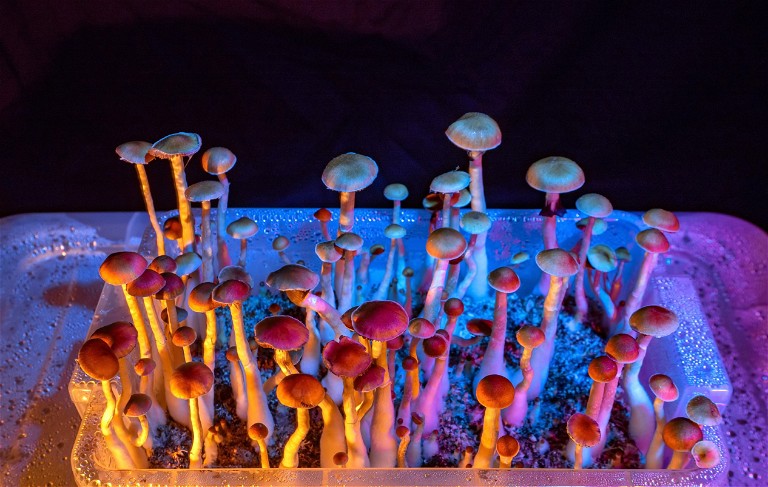Industry Insight
Psychedelic medicines and the treatment of neurological conditions
Rob Conley from Beckley Psytech tells Pharmafocus about the use of psychedelic medicine for the treatment of psychiatric and neurological conditions, and how this field could develop in the future

Pharmafocus: What is the current treatment landscape for psychiatric and neurological conditions?
Rob Conley (RC): Psychiatric conditions like depression and anxiety are primarily managed today through a combination of lifestyle changes, talking therapies and medications, with selective serotonin reuptake inhibitors (SSRIs) being the most common drugs prescribed by doctors or physicians for depression. Neurological conditions often have a different set of interventions available, combining a mix of physical therapy, medications and cognitive rehabilitation exercises. For many people living with neuropsychiatric conditions, the currently available treatments work for them but for others, there can be limited efficacy and challenges that limit treatment adherence, including undesirable side effects and a slow onset of action. Despite many years of work and experience in this field, there remains a strong need for new approaches in order to improve patient outcomes and reduce the burden these conditions have on individuals, healthcare systems and society more generally.
Pharmafocus: What are the issues with current treatments for these conditions?
RC: There are several challenges with the current treatment paradigm for neuropsychiatric conditions, and it may be helpful to look at depression, which typifies a lot of the hurdles we see within the space. For many patients, overcoming the stigma of accessing treatment or therapy is a big challenge, but once they get over that, there are still several difficulties they may encounter with the drug treatments themselves. Antidepressants and SSRIs may carry unwanted side effects like weight gain, sedation and sexual dysfunction that can lead to poor adherence and treatment discontinuation, while the slow onset of action of some medications can delay symptomatic relief and prolong a patients’ suffering. Antidepressants also have limited efficacy, with many people experiencing treatment resistance. Indeed, 33% of patients diagnosed with depression are resistant to available treatments and 60% of patients with depression discontinue or switch SSRI within 12 weeks.1,2 For those living with treatment-resistant depression (TRD), which is characterised when an individual with depression does not respond to two or more courses of antidepressants, treatment opportunities are sadly lacking and there is an urgent need for more effective treatments. Similar challenges can be seen across the treatment landscape for other psychiatric and neurological conditions.
Pharmafocus: How can psychedelic medicines improve treatment of these illnesses?
RC: Over the last decade or so, there has been a growing body of scientific and academic research indicating the potential of psychedelic compounds to address the limitations of current treatment opportunities for psychiatric and neurological conditions. These substances, such as psilocybin, 5-MeO-DMT and MDMA, have demonstrated impressive therapeutic effects in clinical trials, particularly in conditions like TRD, anxiety and post-traumatic stress disorders (PTSD). For example, a study by Johns Hopkins in 2021 found that treatment with psilocybin relieved symptoms of major depressive disorder, or depression, in adults with the condition for up to a month and a follow-up study of those participants in 2022 showed that the antidepressant effects of psilocybin-assisted therapy, when given with supportive psychological support, lasted at least a year for some patients.3
Another study, run by Lykos Therapeutics (previously MAPS PBC), found that patients with PTSD showed significant improvement when receiving MDMA-assisted therapy compared with therapy and placebo.4 Some pharma companies are assessing their own candidates for TRD, alcohol use disorder and major depressive disorder. While there still remains some debate as to exactly how psychedelics elicit their therapeutic effects, current research suggests that it is the induction of a neuroplastic state, as well as an altered state of consciousness, that enables medical benefit.
Neuroplasticity refers to the alteration of the structure and function of neurons, the nerve cells that transmit information within the brain, while altered states of consciousness refers to the psychological state induced by psychedelics that can elicit new perspectives or thoughts that are not usually accessible with everyday consciousness. It is the combination of these two states that can induce deep introspection and emotional processing, which, in turn, could potentially help shift ingrained patterns of thinking or behaviours.
Pharmafocus: What other indications can psychedelic medicines be utilised in?
RC: Psychedelic medicines are being investigated as potential treatments for a wide range of indications beyond depression, anxiety and PTSD. Several studies have indicated the utility of psychedelic treatments for substance abuse and alcohol abuse conditions, and there is emerging evidence that points to the potential of psychedelics to help with eating disorders like anorexia nervosa and bulimia nervosa.5,6 Other studies have explored how psychedelics might assist in palliative care by helping to reduce end-of-life anxiety. A 2016 study found that a single, high-dose of psilocybin given to individuals with life-threatening cancer diagnoses led to a decrease in clinician- and self-rated measures of depression, anxiety and death anxiety, along with increases in quality of life, life meaning and optimism.7 It is a very exciting time for psychedelic and neuropsychiatric research, and we are only at the start of realising the full potential of these compounds.
Pharmafocus: What are the barriers facing the development of more psychedelic medicines?
RC: Despite the growing body of evidence supporting the potential of psychedelics to address some of the most intractable neuropsychiatric conditions in society, there are still a number of barriers to actually bringing these compounds to market. In most countries, psychedelics remain a controlled and scheduled substance, which makes researching them and conducting clinical trials on them more difficult. Stigma also plays a big role. Psychedelics carry a lot of historical baggage and, despite the hype around recent scientific breakthroughs, there continue to be many misconceptions and biases that can blunt public acceptance and scientific progress.
Hopefully following the science and building evidence of best practice and efficacy, those beliefs can change over time. Another challenge is that, because these compounds are relatively new in the medical sphere, there is a lack of standardised protocols for running clinical trials with psychedelics or for providing psychological support alongside their use, which is a barrier to appropriate regulatory oversight and market access. However, there are signs this is changing. In June 2023, the US Food and Drug Administration (FDA) published draft guidance for sponsors developing psychedelic drugs for the treatment of medical conditions, including considerations for designing clinical trials. This was an early signal that work is being done to think about how these novel treatments may eventually integrate into existing healthcare systems.
Overcoming these barriers will require collaborative efforts among researchers, policymakers, healthcare professionals and advocacy groups to ensure responsible and equitable access to psychedelic medicines.
Pharmafocus: How do you see the field of psychedelics developing in the next five years?
RC: There is a lot to be optimistic about. With more interest and investment in this space, we are likely to see more efforts to standardise best practice for psychedelic clinical research and developments, as well as efforts to reschedule psychedelic compounds and enable wider patient access to their therapeutic potential. The US is already making good progress on this front and we may even see MDMA-assisted therapy (MDMA-AT) for PTSD available to those in need within the year. Indeed, Lykos Therapeutics, who successfully completed a phase 3 study of MDMA-AT for PTSD last year, announced in February 2024 that the FDA had accepted their new drug application for MDMA-AT for PTSD and had granted the application priority review with a Prescription Drug User Fee Act target action date of 11 August 2024. If approved, this would be the first MDMA-assisted therapy available in the US.
More broadly, there are other signs that the US medical landscape is preparing for a future where psychedelic medicines are available. The American Medical Association’s Current Procedural Terminology (CPT) III codes for psychedelic-assisted therapies officially went into effect on 1 January 2024. These codes give physicians and qualified healthcare providers a mechanism to seek reimbursement for administering psychedelic-assisted therapy if approved by the FDA. These developments show increasing recognition from medical authorities about the potential of psychedelic therapies and set the scene for how psychedelic medicine may be integrated into mainstream mental health care settings in the future. Challenges around ensuring equitable access, appropriate reimbursement and public education will likely still remain but, as above, with a coalition of voices from across the psychedelic medicine field, we could see a bright future for the treatment of psychiatric and neurological conditions.
References
- Visit: nature.com/articles/s41380-021-01200-3
- Visit: pubmed.ncbi.nlm.nih.gov/11918502/
- Visit: hopkinsmedicine.org/news/newsroom/news-releases/2022/02/psilocybin-treatment-for-major-depression-effective-for-up-to-a-year-for-most-patients-study-shows
- Visit: lykospbc.com/2023-01-05-MAPS-PBC-Announces-Positive-Results-from-Confirmatory-Phase-3-MAPP2-Trial-of-MDMA-Assisted-Therapy-for-Treatment-of-PTSD
- Visit:onlinelibrary.wiley.com/doi/full/10.1111/adb.13229#:~:text=After%20the%20psychedelic%20experience%2C%2083,met%20Alcohol%20Use%20Disorders%20criteria.&text=58%25%20of%20participants%20reduced%20or%20stopped%20their%20alcohol%20since%20commencing%20microdosing
- Visit: pubmed.ncbi.nlm.nih.gov/37352816/
- Visit: pubmed.ncbi.nlm.nih.gov/27909165/

Author bio: Dr Rob Conley is chief scientific and medical officer at Beckley Psytech, in this role, he oversees all of Beckley Psytech’s preclinical and clinical research and development. Rob previously served as senior vice president at Eleusis and chief science officer, Neuroscience at Eli Lilly and Co. Prior to that, he had a long academic career, first at the University of Pittsburgh, US, and at the University of Maryland School of Medicine, US, where he remains an adjunct professor of Psychiatry and Psychopharmacology. He holds an MD from the University of Maryland School of Medicine and a BA from the Johns Hopkins University, both US, and he completed a Psychiatry residency at the University of Pittsburgh, US, where he served as the chief resident. Rob is also a fellow of the American College of Neuropsycho pharmacology.